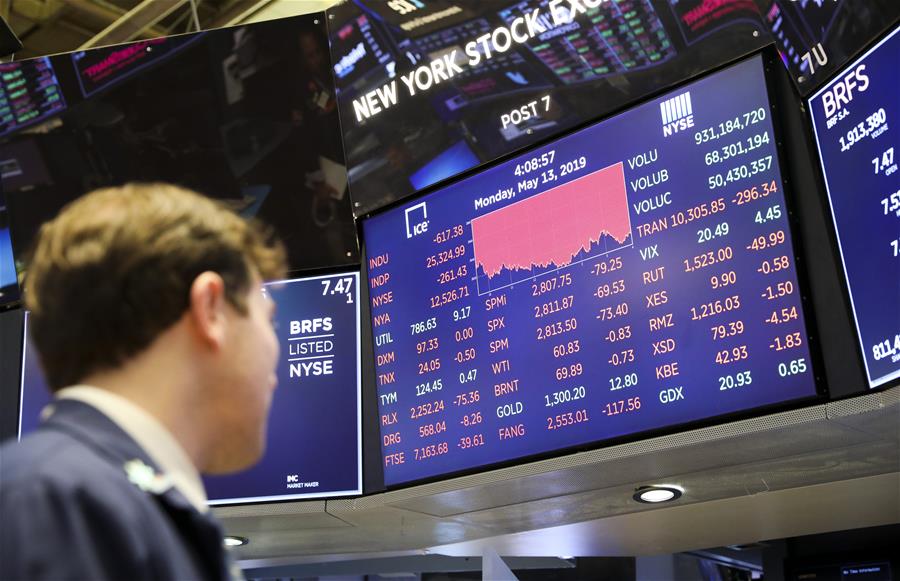
A trader works at the New York Stock Exchange in New York, the United States, on May 13, 2019. U.S. stocks ended lower on Monday. The Dow fell 2.38 percent to 25,324.99, and the S&P 500 was down 2.41 percent to 2,811.87, while the Nasdaq fell 3.41 percent to 7,647.02. (Xinhua/Wang Ying)
by Matthew Rusling
WASHINGTON, May 14 (Xinhua) -- The U.S. stock market on Monday saw the worst sell-off yet this year in response to the trade tensions with China, after Beijing retaliated against recent U.S. tariffs with tariffs of its own.
The sell-off caused the U.S. Dow Jones Industrial Average to plummet over 600 points to 25,324, causing stocks of leading market movers to take a nose dive. All three of the major U.S. stock indices plunged by at least 2.3 percent, and the Nasdaq slid 3.4 percent. Tech stocks took an even bigger hit, especially those that source from China, losing at least 5.8 percent of their value, including Apple and Western Digital.
The drop followed China's announcement that Beijing would raise tariffs on around 60 billion U.S. dollars' worth of American products, in retaliation to Washington's recent tariff hikes on Chinese goods.
Chinese Foreign Ministry spokesman Geng Shuang said at a briefing on the issue that "we have said many times that adding tariffs won't resolve any problem. China will never surrender to external pressure. We have the confidence and the ability to protect our lawful and legitimate rights."
U.S. experts said the trade tensions could negatively impact the U.S. economy, although it is unclear how much the United States would feel the sting.
NEGATIVE IMPACTS OF TRADE TENSIONS
Desmond Lachman, a resident fellow at the American Enterprise Institute, told Xinhua that a full-scale trade war between the United States and China would be "detrimental" to the world's largest economy.
"As we are seeing today, (a major trade war) would have a big impact on the United States and the global financial markets," said Lachman. "This would make U.S. households spend less as they see the value of their shares decline."
"There would also be an impact on U.S. agricultural prices as China retaliated against the United States, which would cause political problems for U.S. President Donald Trump in the farm belt," he added.
Barry Bosworth, an economist at the Brookings Institution, told Xinhua that "the dispute is damaging to U.S. consumers who are being impacted by higher prices on purchases from China and U.S. exporters (particularly agriculture) who are losing a growing share of the Chinese market."
He believes that the United States "is shown to be an unreliable supplier -- everything is about Trump and politics in this new world -- and countries will avoid reliance on U.S. sources."
"Stock market prices will fluctuate in response to the ebb and flow of the negotiations," Bosworth argued, in response to Monday's massive U.S. stock sell-off.
With the trade dispute heating up, Lachman advised that both sides compromise and meet in the middle, but added that political pressures may play a role.
"That might not prove to be easy. President Trump cannot afford to be seen to be soft on China in the run-up to the 2020 presidential elections and allow the Democrats to appear to the electorate as more hawkish than he is on China," he said.
MORE SELL-OFFS TO COME
Lachman said that if a deal is not reached soon, the world will see more sell-offs such as the one seen on Monday in the United States.
"I am afraid that without an early resolution of this trade dispute, we will see global markets selling off a lot," Lachman said.
"This is particularly the case given how elevated those markets had become because of a decade of ultra-easy monetary policy by the world's major central banks," he argued.
Trump "sees the United States having a strong economy so will push the trade war as hard as he can," Darrell West, a senior fellow at the Brookings Institution, told Xinhua.
"He feels it is politically useful for his base to be tough on China and drive a hard deal," said West. "His supporters want to see him standing up for the United States. He could maintain this position through the upcoming elections."
David Dollar, a senior fellow in the John L. Thornton China Center at the Brookings Institution, believes that the trade war may well drag on.
"President Trump seems to think that the tariffs are good for the economy ... Prospects for a quick resolution of the U.S.-China trade war are poor," Dollar told Xinhua.
"China naturally retaliated with new tariffs of its own," said Dollar, adding that since both countries have suffered from the tariffs, China-U.S. trade talks will continue.











